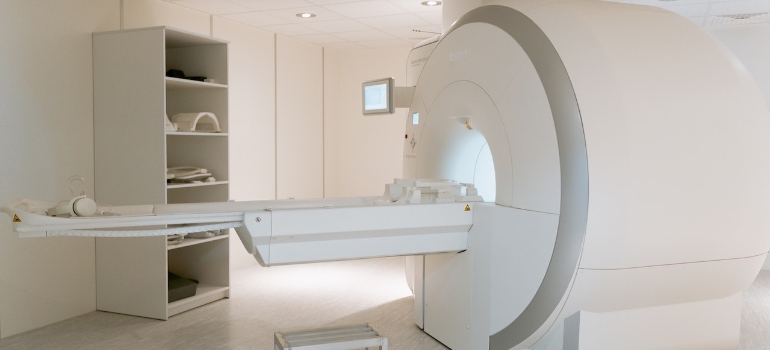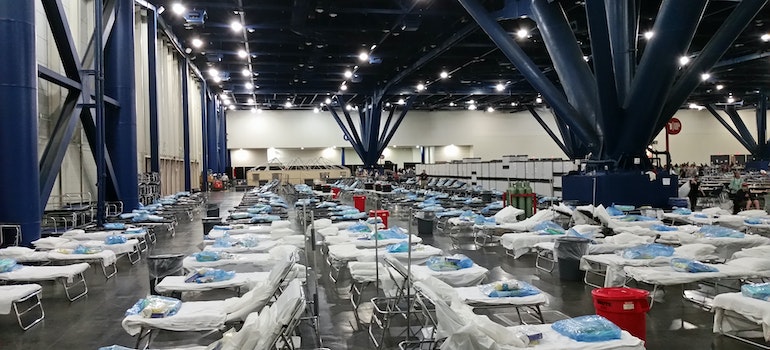The Role of Timely Equipment Shipments for Medical Start-ups
Medical start-ups stand at the forefront of healthcare innovation, offering transformative solutions and pioneering new routes of patient care. However, the engine that drives these ventures isn’t just their groundbreaking ideas but also the efficient delivery of essential equipment. A delay or mishap in logistics can hamstring even the most promising one, making timely equipment shipments for medical start-ups an absolute imperative. Hence, this Peasley Moving & Storage article explores the intricate interplay between groundbreaking healthcare ideas and the logistical necessities that ensure they can be realized to their fullest potential.
The Life Cycle of Medical Equipment Shipping: A Start-up Perspective
The life cycle of medical equipment shipping is a complex, multi-stage journey that’s pivotal to a start-up’s operational efficacy. From initiating robust relationships at the source to ensuring the end-user receives their equipment promptly, each stage holds its own set of challenges and opportunities for medical start-ups.

Origin: Building Relationships with Manufacturers and Suppliers
In the early stages of a start-up, establishing strong relationships with reliable manufacturers and suppliers is paramount. It’s not just about obtaining equipment but ensuring the quality, consistency, and timely availability of those vital resources. Medical start-ups need to vet their potential partners meticulously, focusing on their track record, responsiveness, and alignment with the start-up’s vision. Building trust from the outset can pave the way for smoother transactions, bulk discounts, and even collaborations on custom solutions tailored to the start-up’s unique requirements.
Transit: Overcoming Logistical Challenges Unique to Fledgling Businesses
While established businesses may have the luxury of tried-and-true logistics partners and streamlined processes, start-ups often grapple with finding cost-effective and efficient transit solutions. The challenge intensifies when considering the delicate and often critical nature of medical equipment. A start-up’s reputation can be enhanced or tarnished based on how effectively it can navigate these logistical hurdles. Investing time in researching reputable medical equipment shipping services partners, understanding the nuances of medical equipment transportation, and leveraging technology for real-time tracking can make all the difference.
End-users: Ensuring Timely Delivery to Initial Clients
Whether it’s a renowned health institution or an individual patient, the expectation is clear: timely and safe delivery of medical equipment. For a start-up, this isn’t just a transaction; it’s an opportunity to make a lasting impression. Delivering equipment on time and in perfect condition demonstrates professionalism and reliability. Start-ups should prioritize open communication, keeping clients informed about shipping progress, potential delays, and expected delivery times, thereby fostering trust and cultivating long-term relationships.
Maintenance and Returns: Addressing this Stage Efficiently to Build Trust and Reputation
Post-delivery, the journey doesn’t end. Medical equipment may require maintenance, updates, or, in some cases, returns and inventory storage. How a start-up manages this phase can significantly influence customer retention and word-of-mouth referrals. Implementing a transparent and hassle-free return policy, offering robust customer support for maintenance inquiries, and proactively reaching out to clients for feedback can solidify a start-up’s position as a trusted and customer-centric entity.

The Core Recipients of Medical Equipment Shipments
Understanding the varied needs and expectations of those receiving medical equipment is central to ensuring optimal service and building strong relationships. Each recipient category has its unique challenges and requirements:
- Hospitals and Big Health Institutions;
- Global Health Missions;
- Direct-to-Patient;
- Rural and Remote Clinics.
Addressing these effectively can set a start-up apart in the competitive medical supply landscape.
The Importance of Timely and Safe Deliveries
Major health institutions, with their vast infrastructures and patient volumes, operate on tight schedules and strict protocols. Any delay or mishandling in equipment delivery can have cascading effects, potentially jeopardizing patient care and the hospital’s operations. As a medical start-up owner, you should prioritize precision in delivery timings, outsource to trustworthy freight shipping Boise partners, and ensure equipment safety to meet the stringent standards of these institutions. If you keep fulfilling these criteria consistently, your start-up will foster trust and potentially secure long-term contracts with such establishments.
Timely Equipment Shipments for Medical Start-ups in International Medical Initiatives
Global health missions, whether orchestrated by NGOs, governments, or international coalitions, rely heavily on timely equipment deliveries to address health crises or long-term projects. For start-ups, participating in these initiatives not only serves a humanitarian cause but also positions them as global players. The key here is to understand the unique logistical challenges of different regions, from dealing with customs and import regulations to navigating challenging terrains and offering solutions that ensure equipment reaches its destination promptly and in optimal condition.
The Rise of Home Health Care Solutions
As home health care gains traction, there’s a growing need for medical equipment to be delivered directly to patients’ doorsteps. This shift requires start-ups to adapt their logistics to cater to residential areas, ensuring discreet and timely deliveries. Furthermore, providing comprehensive user manuals, easy-to-follow setup guides, and responsive customer support can significantly enhance the client experience, encouraging loyalty and positive word-of-mouth.
Addressing the Challenges of Reaching Far-Flung Areas
Clinics in rural and remote regions often grapple with accessibility challenges, making the delivery of medical equipment particularly complex. These clinics, however, are vital lifelines for their communities, making it crucial for them to receive timely supplies. For medical start-ups, this means exploring alternative delivery methods, from drone deliveries and searching for ‘shipping container movers near me‘ to partnering with local transportation networks. Beyond just delivering equipment, understanding the unique challenges of these regions and offering tailored solutions can help start-ups make a genuine impact.

Peak Times for Medical Equipment Shipping Demands
The demand for medical equipment shipping isn’t static; it fluctuates based on various factors, from seasonal changes to global health crises. Start-ups must stay informed and agile to navigate these peak times effectively, ensuring their logistics and delivery mechanisms are up to the task.
Seasonal Factors Affecting Demands
Every season presents unique health challenges, leading to specific medical equipment demands. For instance:
- Winter: Increased need for respiratory equipment due to prevalent flu seasons.
- Summer: A spike in demand for hydration and cooling equipment in areas experiencing intense heat waves.
Start-ups should monitor these patterns, stock up in advance, and collaborate with their suppliers. Only if these seasonal needs are anticipated and met timely equipment shipments for medical start-ups can be ensured.
Emergencies and Outbreaks: Rapid Response Requirements
In the face of sudden emergencies—be it natural disasters, industrial accidents, or disease outbreaks—the demand for medical equipment can skyrocket overnight. Here, agility becomes a start-up’s greatest asset. Maintaining a flexible supply chain, having contingency plans in place, and establishing rapid-response teams can make all the difference in these critical situations. So, if your start-up is delivering urgently needed equipment swiftly, it can play a pivotal role in crisis management and save countless lives.
Medical Equipment Shipping in the Post-Pandemic Era: Lessons Learned and New Challenges
The recent pandemic underscored the crucial importance of robust medical equipment supply chains. Lessons from this period include:
- Scalability: The ability to quickly scale up operations is crucial. Start-ups that managed this became invaluable industry players during peak demands.
- Diversification: Relying on a single supplier or route proved risky. Diversifying sources and logistics routes ensures resilience against unforeseen disruptions.
- Digital Tracking: Real-time monitoring of shipments has become more than just a convenience. It turned into a necessity for efficient allocation of resources.
However, the post-pandemic world also presents fresh challenges. Border regulations have evolved, and there’s an increased emphasis on reliable Idaho storage solutions, shipment safety, and sanitation. Start-ups must adapt to these new norms, updating their protocols and ensuring full compliance to thrive in this altered landscape.

Intricacies of Shipping Medical Equipment Across Borders
International shipping is promising immense growth potential for medical start-ups. However, it requires an understanding of logistics and a mastery of regulatory landscapes, cultural nuances, and economic dynamics. So, let’s break down the essential areas to focus on for those aiming to succeed in shipping medical equipment across borders.
Understanding International Regulations and Requirements
When you venture into international territories, the rulebook changes, often dramatically. The crucial factor is recognizing that every country prioritizes the health of its citizens and has established regulations to ensure the safety and efficacy of medical equipment.
Safety Standards Influencing Timely Equipment Shipments for Medical Start-ups
Different countries have varying safety and quality standards for medical equipment. For instance, while the FDA oversees regulations in the U.S., the European Union has its own set of directives and standards. Ensuring that your products comply with each region’s specific standards is not only a legal requirement but also builds trust with your customers.
Documentation
Documentation forms the backbone of international trade. From invoices and packing lists to certificates of origin and product licenses, each document plays a role in ensuring your shipment is received without hindrances. Familiarize yourself with the necessary documentation for each country you ship to, and consider employing experts or specialized software to manage this aspect.
Tariffs and Taxes
The financial aspect of international shipping isn’t just about the shipment cost. Tariffs, duties, taxes, and even fluctuating exchange rates can influence the final cost of your product in the target market. Being aware and planning for these financial elements can prevent unexpected hits to your profit margins.

Strategies for Efficient and Timely Cross-Border Shipments
Once you understand the regulations, the next challenge is ensuring your shipments are efficient and timely.
Leverage Technology
Modern technology offers tools like advanced tracking systems that provide real-time updates, anticipated delivery times, and even potential delay alerts. These tools can be invaluable in managing customer expectations and troubleshooting issues before they escalate.
Utilize Pickup and Delivery International Shipping Services
Opting for door to door shipping international services offers a seamless experience. From pick-up at the origin to delivery at the final destination, these services manage all aspects, reducing the chances of miscommunication, delays, or lost shipments. It’s a comprehensive approach that particularly benefits start-ups, allowing them to focus on their core operations while the logistics are handled by experts.
Establish Reliable Partnerships
International shipping isn’t just about moving products across borders; it’s about building bridges. Establishing ties with local distribution partners, understanding cultural nuances in business dealings, and even being aware of regional holidays or events that might delay shipments can streamline your operations.
Potential Pitfalls and How to Avoid Them
With the promise of international markets also come potential challenges in timely equipment shipments for medical start-ups. Anticipating these and having mitigation strategies in place is crucial.
Customs Delays
One of the most common issues in international shipping is delays at customs. This can be due to incomplete or incorrect documentation, discrepancies in shipment details, or even random checks. Ensuring meticulous paperwork and building relationships with local customs brokers can help navigate these waters.
Transit Damage
With multiple handling points and longer transit times, the risk of equipment damage increases. Investing in quality packaging, training staff on handling protocols, and even insuring shipments against potential damage can offer both financial security and peace of mind.
Unforeseen Costs
Whether it’s a sudden change in tariffs, additional handling fees, or unexpected storage charges due to delays, unforeseen costs can be a blow to start-ups. Having a contingency fund, regularly updating yourself on international trade developments, and setting clear terms and conditions with one of the most trusted freight companies Idaho has can shield you against such unexpected expenses. Hence, getting deeply familiar with these areas can help medical start-ups transition from being local players to global giants. All while ensuring their equipment reaches those in need, wherever they may be.

Strengthening Global Health Initiatives: The Start-up Contribution
Although perhaps smaller in scale compared to industry giants, medical start-ups hold immense potential in shaping global health landscapes. Their agility, innovation, and drive make them essential players in this domain.
How Even New Medical Start-ups Can Make a Significant Impact on Global Health
New ventures bring fresh perspectives, innovative solutions, and the flexibility to adapt. Medical Start-ups’ smaller scale often allows for quicker decision-making and more personalized approaches to challenges. These attributes mean that even newer start-ups can fill gaps in the market, respond quickly to emerging health crises, or introduce game-changing products and services that larger entities might overlook.
How Timely Equipment Shipments for Medical Start-ups Enhance Their Reputation
In the global health sphere, reliability is paramount. When a start-up consistently delivers equipment on time, it earns trust. This reliability, amplified by the pressing nature of medical needs, can elevate a start-up’s reputation rapidly. A solid track record of punctual deliveries can open doors to partnerships, collaborations, and larger contracts in international markets.
Balancing Profit and Purpose: The Dual Benefits of Being Involved in Global Health Initiatives
Participation in global health initiatives isn’t just about altruism—it’s also a smart business move. While contributing positively to global health creates a sense of purpose and fulfillment, it also offers tangible business benefits. These range from increased brand visibility and goodwill to potential tax benefits and partnerships with global organizations. It’s a win-win situation where start-ups can bolster their bottom lines while making a meaningful impact on global health.
Mastering Logistics is The Keystone of Medical Start-up Success
The journey of medical start-ups is intrinsically linked with the logistics of equipment shipping. From the very inception of an idea to its realization on a global stage, the importance of timely and efficient equipment shipping remains constant. As start-ups evolve and grow, a proactive and strategic approach to logistics becomes even more essential. Timely equipment shipments for medical start-ups are not just about moving products but saving lives, building trust, and carving out a niche in the global market. For medical start-ups poised for success, mastering the nuances of equipment shipping could very well be the key differentiator.

